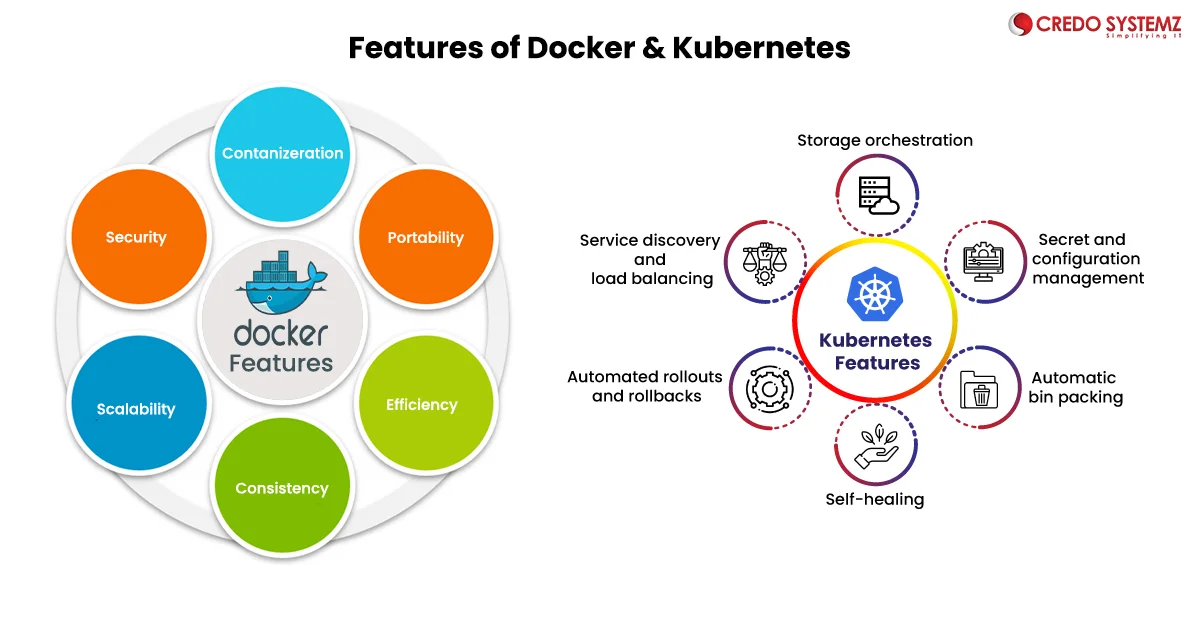Docker vs Kubernetes – 10 Key Differences

Docker
Docker is an open-source platform to containerize software that can easily build the application.It helps to create, deploy, and run applications in containers. Docker provides a portable way to package and distribute applications.It is a lightweight, portable, and scalable platform.Docker is preferred by developers to run applications. It has a large,active community and provides excellent documentation, support.
Top Features of Docker
- Contanizeration: To package applications and dependencies into a single, portable container that can run on any platform.
- Portability: Docker containers are portable and can run on any platform.
- Efficiency: Docker containers are lightweight and efficient that can run on a single host.
- Consistency: Docker provides a consistent runtime environment for applications.
- Scalability: Docker provides a scalable solution for running applications.
- Security: Docker provides a secure platform with resource limiting, access controls and more.
Refer Here : Why developers should learn docker kubernetes in 2023 | Why and How to learn Docker-Kubernetes ? | Docker vs Kubernetes
Kubernetes
Kubernetes is an open-source container orchestration platform. It automates the deployment, scaling, and management of containerized applications. Kubernetes provides flexibility to manage containers at scale. It is easier to deploy and manage complex applications in a cloud-native environment.
Top features of Kubernetes
- Container orchestration: To automate the deployment, scaling, and management of containerized applications.
- Scalability: Designing to be highly scalable to easily add or remove containers.
- Load balancing: Kubernetes provides built-in load balancing features to ensure optimal performance and availability.
- Self-healing: capabilities to automatically detect and recover from failures.
- Rollouts and rollbacks: of application updates to deploy new features or roll back changes.
- Configuration management: to define and manage configurations for their applications.
Docker vs Kubernetes
Docker and Kubernetes are both important tools in modern application development and deployment. They can be used together in a complementary way.The major differences of Docker and Kubernetes are given below:
- Docker is a containerization technology that is container runtime whereas Kubernetes is a container orchestration platform for running and managing containers.Docker allows to create and manage containers while Kubernetes allow to run and manage containers
- To pack the applications and dependencies into a single, portable container, Docker is used. It provides a consistent runtime environment to deploy and run them.Kubernetes automates the deployment, scaling, and management of containerized applications.
- In Docker the setup and installation are easier whereas in Kubernetes installation is hard.
- In Kubernetes, Internal load balancing is available while docker does not have native load balancing capabilities.Kubernetes need manual setup of load balancer but Auto load balancer in Docker
- Applications are deployed in Docker in the form of services. In Kubernetes,Applications are deployed as a combination of Deployment,pods, and services.
- Providing framework for storage orchestration is available in Kubernetes but not in Docker.
- Kubernetes needs separate CLI tools whereas Docker integrates with Docker CLI.
- Health checks in Docker are limited to service.The health checks in Kubernetes are liveness and readiness.
- Docker is lightweight and easier to learn when compared to Kubernetes which is complex and powerful.
- Docker documentation is more effective from installation to deployment.Kubernetes does not have extensive documentation.
Docker and Kubernetes
Docker and Kubernetes are both popular tools used in containerization.They work together to provide a complete solution for containerized application deployment. Developers use Docker to build and package into containers.Kubernetes is used to deploy and manage the containers at scale.
Kubernetes can manage Docker containers which is the most commonly used container runtime. Kubernetes uses Docker images to create new containers, manage their lifecycle, and scale them.Docker provides the means to create and package container images. Kubernetes provides the platform to manage and orchestrate the containers.
Docker and Kubernetes provide a powerful solution for modern application deployment.It serves as digital transformation enablers and tools for modern cloud architecture. Docker and Kubernetes are used in the industry for faster application deployments and releases.
Finally, Docker and Kubernetes are the next level technologies for cloud computing. It is an important skill for IT professionals to move to the Cloud platform.To experience career growth, This is the right time to acquire these skills using Credo Systemz courses.
